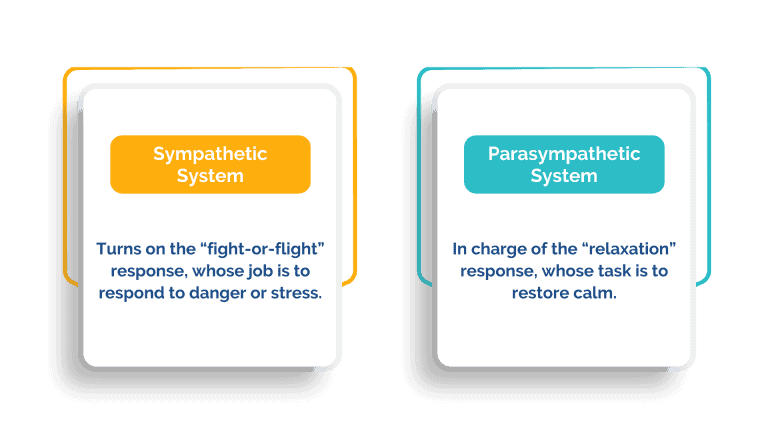Manage Stress to Calm MS

If you live in the modern world, you’re no stranger to stress. Stressors like family life, job demands, and information overload are just a few ways our nervous systems get overactivated, not to mention dealing with a chronic condition like multiple sclerosis.
As a person living with MS and knowing that stress is one of the strongest drivers of MS relapses, disease progression, and symptoms, what can you do to mitigate this?
What is stress?
In simple terms, stress is a mismatch between what is being “demanded” of us and our ability to “cope” with that demand.
Take a crying baby, for example, where the crying is the “demand.” While one parent may be able to remain calm and carry on while the baby cries, the other parent may perceive the crying as “too much demand” and as a result rush to calm that baby. Each parent has a different perception of the demand or the stressor (the crying) and responds or copes accordingly.
Think about this: our modern world is a barrage of stressors. Your job may have unlimited access to you through your smartphone or work computer. Your calendar is over-scheduled by events for your kids or aging parents. You are inundated by negative information reaching you on the internet or TV. You go through the day reacting, and you wonder why you feel so drained at the end of the day.
These stressors that affect us run like an undercurrent, barely noticeable, until our bodies bring it to our attention via symptoms like anxiety, sleep disruption, and low mood, or if it goes on too long, a diagnosis like MS.
How does stress enter our bodies?
Stress is not just an idea in your head.
Rather, stress is information we collect from our physical and emotional environment to evaluate with our senses and perceptions. As we saw above, the crying baby delivered information, and the parent evaluated it and responded.
If we perceive information from our environment indicating danger or an emotionally-charged situation ahead, we immediately tap into our “stress response” to release hormones, neurotransmitters, and cytokines. These chemical messengers communicate to the body to go on high alert and get ready to fight or run. These molecular messengers are the delivery method of stress from the external environment into the body.
How does the nervous system respond to stress?
Our nervous system houses an intricate system to manage all of the automatic functions of our body. Called the autonomic nervous system, it ticks away without our conscious effort, controlling our heart rate, breathing rate, whether or not the gut moves or stands still, and even the size of our pupils that allows us to focus on nearby or distant objects. All of these functions allow us to respond and adapt to our changing environment.
There are two opposing branches to this autonomic nervous system that work together:

The ultimate goal of these two seemingly opposing systems is to protect us, allowing us to respond appropriately to our environment to improve our chances of survival.
How does stress affect the body?
When stress is detected and chemical messengers are released, the fight-or-flight response of the nervous system is activated. The body reacts by increasing heart rate, blood pressure, and breathing rate. It also shifts blood away from organs like the gastrointestinal system and towards the muscles in our arms and legs so we can fight or run away. None of this goes unnoticed by the immune system, which revs up its defenses to create inflammation to deal with intruders and injury alike.
Historically, the fight-or-flight response was activated in our ancestors when they saw a predator or had a fearful experience in the wild. In modern life, however, the same stress response can be triggered by very different events, like seeing your boss’s name unexpectedly in an email notification, the constant dinging from your smartphone, the potential for a fight or argument, and of course that crying baby.
What happens to the immune system when stress lingers?
When the fight-or-flight response remains activated due to prolonged stress, it sends a danger signal to the entire body, calling in for backup. The immune system is one of the first responders, gearing up to defend the body by creating inflammation. The hormone system also steps in, spiking cortisol levels to raise blood sugar to fuel the fight ahead. The gut microbiome also takes note and shifts its species and metabolic activity towards molecules that mobilize the body.
Changes in Body Functions with Chronic Stress
Nervous System
Activates
fight-or-flight
Immune System
Creates inflammation
Hormone System
Spikes
cortisol
Gut Microbiome
Shifts towards
unfriendly bacteria
The longer stress lingers, the more your immune system will continue to amplify inflammation and other immune processes. It’s not hard to imagine that under constant stress, this process of creating inflammation can spin out of control. In fact, the immune system may keep creating inflammation even when the threat has passed. This is a sign of a disordered or “dysregulated” immune system that has gotten confused and forgotten the rules of how to behave.
Does stress affect MS?
As mentioned above, chronic stress tips the balance of the immune system towards creating inflammation. Without an “off” signal in sight, you can predict the chaos ahead: as the immune system continues to create inflammation throughout the body, our own tissues can get caught in the crossfire.
In the case of MS, the immune system attacks myelin, the fatty layer covering nerves. When myelin is damaged, information can no longer flow swiftly throughout the central nervous system.

How does this feel in our bodies? As the flow of information is slowed down due to loss of myelin, symptoms can include:
- More weakness or changes in sensation in our arms and legs
- Altered vision
- Increased fatigue
- Increased pain
There is no limit to the symptoms we can feel because there is no limit to where myelin can get damaged in the brain or spinal cord.
How to stop stress from disrupting the immune system
Stressors are just one part of the equation. How we perceive and respond to stressors has a lot to do with how much stress impacts our bodies.
Recall that the fight-or-flight response lives in the autonomic nervous system, which doesn’t require our conscious effort to come alive. Because of this, you may feel like there’s nothing you can do to manage your nervous system response.
But the truth is, we DO have significant control over the autonomic nervous system. Breathwork, mindfulness, and meditation are among the most powerful regulators of this system. These techniques all enhance the relaxation response. Without it, our nervous systems would be in a perpetual state of fight or flight, with no chance for our nervous and immune systems to recover.
Take that parent who rushed to quiet the crying baby. Were he to remind himself that the baby has been fed and changed and the crying is the baby’s way of soothing himself, he may not have rushed so quickly to quiet the baby. Also, taking a few breaths in this situation, centering himself, and heading over to check on the baby in a controlled manner would have placed less burden on his nervous system.
We can’t always choose the stresses that come our way,
but we CAN choose our perceptions and reactions.
Making the intentional decision to be less reactive and more grounded tips the balance of the immune system in our favor, away from inflammation and towards more order and regulation.
I know this to be true from observing my patients as well as participants from the Live Well with MS foundations program. As they increase their awareness of their automatic behaviors and shift their perceptions and reactions, like pausing to reframe a stressful situation or taking a few deep breaths before reacting, their MS symptoms begin to shift as well.

Make empowered choices
Over the coming series of posts, we’ll take a look at some of the more effective lifestyle strategies for stress management, from mindfulness and meditation to guided imagery.
In the meantime, check out the article “5 Ways to Relieve Stress” from The Center for Mind Body Medicine, one of Dr. Susan’s favorite resources for stress.
More resources to learn about the effects of stress and techniques to manage it:
Do you want to deepen your health journey?
Join the "Live Well with MS" foundations program
Learn the details and get coaching support on implementation
alongside a growth-minded community of people living with MS.




Responses